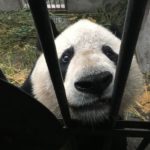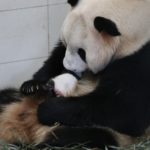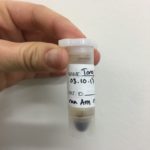[vc_row][vc_column][vc_column_text]The Role of Mate Preference in the Reproductive Success of the Giant Panda-
 PDXWildlife, in coordination with the Oregon Zoo, the San Diego Zoo, and Portland State University have expanded their conservation projects into Asia working on the iconic conservation species the giant panda. We will be conducting research at the China Conservation and Research Center for Giant Pandas (CCRCGP) at the Bifengxia Panda Reserve in Ya’an, China. Giant pandas are notorious for their reluctance to breed in captivity, and applying the previous findings from our pygmy rabbit studies to this critically endangered species could be the key to increasing population sizes. In a broader context, these studies will improve our understanding of the role of mate choice in captive-bred endangered species and may bring to light one of the main causes of reproductive failures in captivity; the lack of mate choice under current management strategies.
PDXWildlife, in coordination with the Oregon Zoo, the San Diego Zoo, and Portland State University have expanded their conservation projects into Asia working on the iconic conservation species the giant panda. We will be conducting research at the China Conservation and Research Center for Giant Pandas (CCRCGP) at the Bifengxia Panda Reserve in Ya’an, China. Giant pandas are notorious for their reluctance to breed in captivity, and applying the previous findings from our pygmy rabbit studies to this critically endangered species could be the key to increasing population sizes. In a broader context, these studies will improve our understanding of the role of mate choice in captive-bred endangered species and may bring to light one of the main causes of reproductive failures in captivity; the lack of mate choice under current management strategies.
The Role of Male-Male Competition on Reproductive Performance-
 Poorly motivated male giant pandas are often blamed for captive breeding failures. The wild mating system is in stark contrast to current captive breeding methods. In the wild, rival males will compete to establish dominance for an oestrous female, with the winner securing breeding rights. In captivity, males have no intrasexual interaction and are introduced to one female that has been genetically recommended based on inbreeding and kinship parameters. Understanding how giant pandas perceive and respond to male-male competition during the breeding season may be critical to increasing reproductive success, particularly in animals that may be underrepresented in the gene pool. This research has the potential to directly bolster the in-situ giant panda population through increasing the genetic diversity and number of individuals produced in captivity that are available for the reintroduction program.
Poorly motivated male giant pandas are often blamed for captive breeding failures. The wild mating system is in stark contrast to current captive breeding methods. In the wild, rival males will compete to establish dominance for an oestrous female, with the winner securing breeding rights. In captivity, males have no intrasexual interaction and are introduced to one female that has been genetically recommended based on inbreeding and kinship parameters. Understanding how giant pandas perceive and respond to male-male competition during the breeding season may be critical to increasing reproductive success, particularly in animals that may be underrepresented in the gene pool. This research has the potential to directly bolster the in-situ giant panda population through increasing the genetic diversity and number of individuals produced in captivity that are available for the reintroduction program.
Total Mercury and Methylmercury in Captive and Wild Giant Pandas-
 China relies heavily on coal as an energy source, which pollutes natural areas surrounding major city centers with mercury. This mercury pollution is potentially harmful to captive wildlife being housed in zoos near city centers that may be exposed to contaminants. We collected the leaves and culms of the wild bamboo plant (Fargesia robusta), which is regularly eaten by giant pandas, at three sites near the China Conservation and Research Center for the Giant Panda (CCRCGP), and analyzed them for total mercury (THg) concentrations. THg and methylmercury (MeHg) concentrations in hair were measured to quantify mercury exposure for captive giant pandas. A significant variation between sample site locations in leaf total mercury was observed with sites closer to the city center showing higher levels of THg. Our results indicate that pandas from Bifengxia show a limited exposure to
China relies heavily on coal as an energy source, which pollutes natural areas surrounding major city centers with mercury. This mercury pollution is potentially harmful to captive wildlife being housed in zoos near city centers that may be exposed to contaminants. We collected the leaves and culms of the wild bamboo plant (Fargesia robusta), which is regularly eaten by giant pandas, at three sites near the China Conservation and Research Center for the Giant Panda (CCRCGP), and analyzed them for total mercury (THg) concentrations. THg and methylmercury (MeHg) concentrations in hair were measured to quantify mercury exposure for captive giant pandas. A significant variation between sample site locations in leaf total mercury was observed with sites closer to the city center showing higher levels of THg. Our results indicate that pandas from Bifengxia show a limited exposure to
Personality and Domestication Effects-
 Is personality undergoing selection in captivity? We aim to determine if personality is genetically determined and if certain personalities are preferred. This is one of our favorite studies as we get to see how each bear reacts to certain objects- Exciting stuff.
Is personality undergoing selection in captivity? We aim to determine if personality is genetically determined and if certain personalities are preferred. This is one of our favorite studies as we get to see how each bear reacts to certain objects- Exciting stuff.
Stereotypic Observations and Reproductive Success-
 Determine if different stereotypies contribute differently to predicting reproductive success. This comes with a large amount of additional questions that will be answered on panda behaviors. Stereotypes are often viewed as negative behaviors in response to the captive environment. However, we believe Stereotypic behaviors are more of a coping mechanism that might allow the bears to be better situated to their environment.
Determine if different stereotypies contribute differently to predicting reproductive success. This comes with a large amount of additional questions that will be answered on panda behaviors. Stereotypes are often viewed as negative behaviors in response to the captive environment. However, we believe Stereotypic behaviors are more of a coping mechanism that might allow the bears to be better situated to their environment.
Maternal Care Observations-
 Maternal care observations are recorded between mother and cub to study the development of maternal behavior from year to year. We hope to also determine what defines successful mothering styles and the outcome this has on future cub production. Maternal care observations take place during the late fall and continue into the winter months. Seeing these wonderful cubs grow up under different parenting styles is fascinating work.
Maternal care observations are recorded between mother and cub to study the development of maternal behavior from year to year. We hope to also determine what defines successful mothering styles and the outcome this has on future cub production. Maternal care observations take place during the late fall and continue into the winter months. Seeing these wonderful cubs grow up under different parenting styles is fascinating work.
Fecal Hormone Analysis-
 Panda feces holds a particular history that allows us to see what was going on in their recent past. In particular, what does their hormone profile look like and why? What would cause certain peaks and valleys in their hormones? In the wild, a few males will travel to and compete for the right to mate with the female. The time surrounding this competition, male hormone profiles will spike and then return to a resting or nadir level. In captivity, males are housed next to females year-round. Does this mean that captive male are expending energy to keep their hormone profiles elevated for the entire year?All of our intern cycles participate in this project as their is alway a large amount of freeze drying and collecting that takes place throughout the year.
Panda feces holds a particular history that allows us to see what was going on in their recent past. In particular, what does their hormone profile look like and why? What would cause certain peaks and valleys in their hormones? In the wild, a few males will travel to and compete for the right to mate with the female. The time surrounding this competition, male hormone profiles will spike and then return to a resting or nadir level. In captivity, males are housed next to females year-round. Does this mean that captive male are expending energy to keep their hormone profiles elevated for the entire year?All of our intern cycles participate in this project as their is alway a large amount of freeze drying and collecting that takes place throughout the year.
Blood Lead Levels (BLL’s) in Captive Giant Pandas-
 The environment in which captive giant pandas predominantly live, gives rise to the need to further understand the levels of lead to which these beautiful bears are being exposed. The more we understand the factors that are adversely affecting threatened and endangered species, the better suited we’ll be to assist in their recovery. Magellan’s donation of the LeadCare II test kits will help us better understand the effects that lead exposure might be having on the giant pandas around China’s urban centers.
The environment in which captive giant pandas predominantly live, gives rise to the need to further understand the levels of lead to which these beautiful bears are being exposed. The more we understand the factors that are adversely affecting threatened and endangered species, the better suited we’ll be to assist in their recovery. Magellan’s donation of the LeadCare II test kits will help us better understand the effects that lead exposure might be having on the giant pandas around China’s urban centers.
Gengda Reintroduction Studies-
 Our first foray into this milestone was in January of this year and is still in it’s infancy. We are still in the works to develop a behavior competency screening protocol for pre-release training candidates that can be used to identify individuals that have a higher probability of being successful upon reintroduction into the wild. Be sure to check out our internship page if you are interested in apply to work on this once-in-a-lifetime study.
Our first foray into this milestone was in January of this year and is still in it’s infancy. We are still in the works to develop a behavior competency screening protocol for pre-release training candidates that can be used to identify individuals that have a higher probability of being successful upon reintroduction into the wild. Be sure to check out our internship page if you are interested in apply to work on this once-in-a-lifetime study.
——————————————————–
The upcoming winter season marks our sixth year studying pandas in Sichuan, China and we couldn’t be more excited. We’ve added additional research opportunities including Reintroduction and Weaning studies at Gengda!. With the added research we have also opened internship positions that provide an opportunity for any qualified applicant a chance to live and study in China. These positions fill very quickly as this is a unique opportunity to get up close to one of the worlds most precious species. For more information on the internship, Click here- PDXWildlife Internships
Here are a few videos to give an idea of what panda bear interactions look like. Feel free to email us at anytime with questions- pdxwildlife@pdxwildlife.com
[/vc_column_text][/vc_column][/vc_row]
